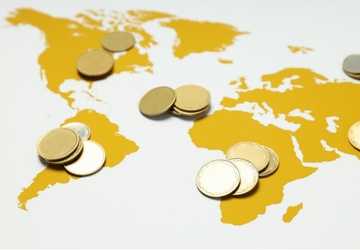When to Consider Investing in International Markets
Have you ever thought about taking your investment strategy global? It’s not just for tycoons and conglomerates anymore. With the world more connected than ever, investing in international markets has become a viable option for individual investors looking to diversify their portfolios and maybe even catch the wave of growth in emerging markets.
The opportunity to invest globally allows you to access markets that offer higher growth and diversification. Reading on, you can see the benefits of international investing and what you need to know before doing it.

Understanding International Markets
Exploring the benefits of international investing and capitalization opportunities can open up a spectrum of opportunities beyond your local market. Understanding different economic, regulatory, and cultural environments is key for successful international investing.
Let’s see a practical guide on how to deepen your knowledge of international markets:
Number 1 - Broaden Your Knowledge Base
To effectively grasp the complexities of international markets, you must access a wide range of information sources. Subscribing to global economic reports from services like the Financial Times, The Wall Street Journal, and Bloomberg can provide you with a comprehensive overview of global markets.
These publications cover major economic events, market trends, and geopolitical changes that can influence international investment opportunities. Regular reading of these reports will keep you well-informed and prepared to make educated investment decisions.
Number 2- Attend Seminars and Workshops
Engaging directly with financial experts and scholars can significantly expand your knowledge of timing for global investments. Many financial institutions, investment firms, and educational institutions offer seminars and workshops focusing on global economics and market trends. These events not only provide valuable insights into the workings of different markets but also offer the opportunity to ask questions and discuss topics with experts.
Additionally, attending these seminars can help you build a network of contacts who are also interested in or are already investing internationally, which could prove invaluable as you navigate global markets.
Number 3 - Use Online Resources and Tools
The internet is filled with information and tools that can aid in understanding international markets. Numerous websites offer free or subscription-based access to market analysis, economic data, and investment strategies specific to various countries. Websites like Investopedia, MarketWatch, and the Economist offer articles, tutorials, and videos that explain complex financial concepts and provide updates on international markets.
Online courses on platforms like Coursera or Udemy can offer structured learning paths on international finance and investing designed by academic and industry professionals.
Benefits of Investing in International Markets
Investing in international markets offers significant advantages that can better your overall portfolio. By exploring global opportunities, you can achieve better diversification and potentially higher returns.
The benefits of international investing include:
- Diversification: Reduces risk by spreading investments across various regions and economies
- Growth Opportunities: Access to higher growth potential in emerging markets
- Currency Diversification: Protects against home currency depreciation and takes advantage of favorable exchange rates
- New Markets and Sectors: Exposure to industries not available domestically
- Higher Returns: Potentially greater returns from fast-growing economies
Risks Associated with International Investing
While international markets can be lucrative, they come with their own set of risks. Understanding these risks is key to managing your investments wisely.
Political instability, economic fluctuations, and currency risks are just a few of the factors that can affect the stability and profitability of international investments. So, what you need to watch out for is:
- Political Instability: Government changes or turmoil can disrupt markets
- Currency Risks: Fluctuations in foreign exchange rates can impact returns
- Economic Downturns: Global or regional recessions can hit hard
When to Start Investing Internationally

When looking for international market investment tips, know that it’s not just about picking a country randomly on the map. It involves strategic timing based on a comprehensive analysis of several key factors.
Here is when you can find the perfect timing for global investments:
When Domestic Markets Are Overvalued
All international market investment tips say that if stock prices in your home country are significantly higher than their historical averages, it could indicate that the domestic market is overvalued. High valuations limit future growth prospects, as there is less room for stock prices to increase further. In such cases, investing abroad might provide better value and growth potential.
When There’s a Strong Domestic Currency
A strong home currency allows you to buy more foreign assets for the same amount of money, effectively increasing your buying power. This can increases your investment returns when the currency eventually weakens. Additionally, investing when your currency is strong can act as a hedge against future currency depreciation, protecting your portfolio’s value.
When International Markets Are Undervalued
Look for international markets that are trading below their historical price-to-earnings (P/E) ratios, as this can indicate undervaluation and potential for growth. Markets recovering from economic downturns often present undervalued opportunities that can yield significant returns as they rebound.
By identifying and investing in these markets, you can capitalize on their growth potential and benefit from their recovery. This strategy can provide an advantageous entry point and improve your portfolio’s performance.
During Periods of Global Growth
If the global economy is experiencing growth, particularly in emerging markets, it could be a good time to invest internationally. Emerging markets often provide higher growth potential compared to developed markets, as they undergo rapid economic expansion. Growth in global trade and technological advancements can also create new investment opportunities in different regions.
When Diversification Is Needed
If your portfolio is heavily weighted towards one region or sector, international investments can spread risk and reduce exposure to local economic downturns. Diversifying internationally provides broader exposure to different economic cycles, industries, and growth opportunities. This approach can protect your portfolio from regional market volatility and strengthen its stability.
When You Have Done Thorough Research
Invest internationally only after you’ve conducted thorough research on the economic conditions, political stability, and regulatory environment of the target markets. Having a deep understanding of the markets you are entering guarentees you make informed investment decisions and manage risks effectively. By being well-informed, you can identify the best opportunities and avoid potential pitfalls.
This knowledge allows you to navigate international investments with greater confidence and success.
When You Have a Long-Term Investment Horizon
International investments can be volatile in the short term, so it’s important to have a long-term horizon. This allows you to ride out short-term fluctuations and benefit from long-term growth. Long-term investments also benefit from the compounding effect, doubling returns over time. By maintaining a long-term perspective, you can maximize the potential of your international investments and achieve your financial goals.
When You Have Stable Personal Finances
Make sure your personal financial situation is stable before investing internationally. This includes having a diversified domestic portfolio and sufficient emergency funds. Stable finances allow you to take on the additional risks associated with international investments without jeopardizing your financial security. By having a solid financial foundation, you can confidently explore international opportunities and help your portfolio’s growth potential.
Conclusion
Investing in international markets offers a pathway to diversify investment portfolios and tap into unique opportunities for growth and returns. By understanding and navigating the complexities of global markets, you can effectively position your investment strategy to capitalize on international trends.





